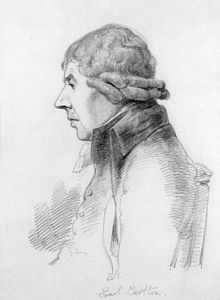Hugh Carleton, 1st Viscount Carleton

Hugh Carleton, 1st Viscount Carleton PC (I) SL (11 September 1739 – 25 February 1826), was an Irish judge.
Early life
Carleton was born in Cork city, son of Francis Carleton (1713–1791) and Rebecca (d.1791), daughter of Hugh Lawton of Castle Jane and Lake Marsh Co. Cork. His father was a wealthy merchant from a family which settled in Cork in the time of Charles I; he was also a powerful local politician, popularly known as "the King of Cork" for his opulence and respectability.[1] His maternal grandfather, Hugh Lawton, was a member of the Lawtons of Lawton Hall, Cheshire, who came to Ireland with William III. Hugh Carleton was educated at Kilkenny College, where he became friends with John Scott who stood up for him and protected him. In gratitude, Hugh's father became patron to Scott, the future Earl of Clonmell, and sent both the boys off to Trinity College, Dublin and Middle Temple with equal allowances. Hugh matriculated at Dublin in 1755 and entered Middle Temple in 1758. He was called to the Irish Bar in 1764, becoming King's Counsel in 1768.
Political career
With his father's influence Carleton was assured of a seat in the Irish House of Commons: he was elected member for Tuam in 1772, for Philipstown in 1776 and for Naas in 1783. As a politician he was not a success: M.P.s complained he was inaudible,[1] though oddly this fault did not prevent him becoming a highly successful barrister.
Judicial career
Carleton was Recorder of Cork in 1769, Third Serjeant in 1776 and Second Serjeant in 1777. He became Solicitor General for Ireland in 1779 and Chief Justice of the Irish Common Pleas from 1787 to 1800. In 1787 he was invested as a member of the Privy Council of Ireland. He was raised to the Peerage of Ireland as Baron Carleton, of Amner in the County of Tipperary, on 17 September 1789, and was further honoured when he was made Viscount Carleton, of Clare in the County of Tipperary, on 21 November 1797, also in the Irish peerage.[2] On his death in 1826, both titles became extinct.
Personal life
Lord Carleton was highly regarded as a judge, but his hypochondria made him a subject of ridicule, since like many hypochondriacs he enjoyed excellent health. His decision to retire on health grounds at 60 was greeted with derision, fully justified since he survived another quarter century.[1] His former friend Lord Clonmell, whose diary is full of savage attacks on his colleagues, describes Carleton there as "a worthless wretch, though I am his maker"; but no one else seems to have shared this view.[3]
He married firstly in 1766 Elizabeth Mercer of Dublin, who died in 1794, and secondly the following year Mary Buckley of Dorset who died in 1810. He had no children by either marriage. He lived at Willow Park, Booterstown and at a succession of town houses in Dublin. In his last years he lived in London and died at Hanover Square.[4]
He was a member of the Royal Irish Academy.
Notes
References
 Henderson, Thomas Finlayson (1887). "Carleton, Hugh". In Stephen, Leslie. Dictionary of National Biography 9. London: Smith, Elder & Co.
Henderson, Thomas Finlayson (1887). "Carleton, Hugh". In Stephen, Leslie. Dictionary of National Biography 9. London: Smith, Elder & Co. - Hart, A. R. "Carleton, Hugh, Viscount Carleton (1739–1826)". Oxford Dictionary of National Biography (online ed.). Oxford University Press. doi:10.1093/ref:odnb/4675. (Subscription or UK public library membership required.)
- Balll, F. Elrington The Judges in Ireland 1221–1921, John Murray, London, 1926, Vol. 2.
External links
| Parliament of Ireland | ||
|---|---|---|
| Preceded by William Tonson Richard Power |
Member of Parliament for Tuam 1772–1776 With: William Tonson |
Succeeded by James Browne Sir Henry Lynch-Blosse |
| Preceded by Duke Tyrrell Richard Rochfort-Mervyn |
Member of Parliament for Philipstown 1776–1783 With: John Handcock |
Succeeded by John Toler Henry Cope |
| Preceded by Hon. John Bourke Thomas Allan |
Member of Parliament for Naas 1783–1787 With: Lord Naas |
Succeeded by Lord Naas Sir Richard Gorges-Meredyth |
| Legal offices | ||
| Preceded by Robert Hellen |
Solicitor-General for Ireland 1779–1787 |
Succeeded by Arthur Wolfe |
| Preceded by Marcus Paterson |
Chief Justice of the Irish Common Pleas 1787–1800 |
Succeeded by The Lord Norbury |
| Peerage of Ireland | ||
| New creation | Viscount Carleton 1797–1826 |
Extinct |
| Baron Carleton 1789–1826 | ||